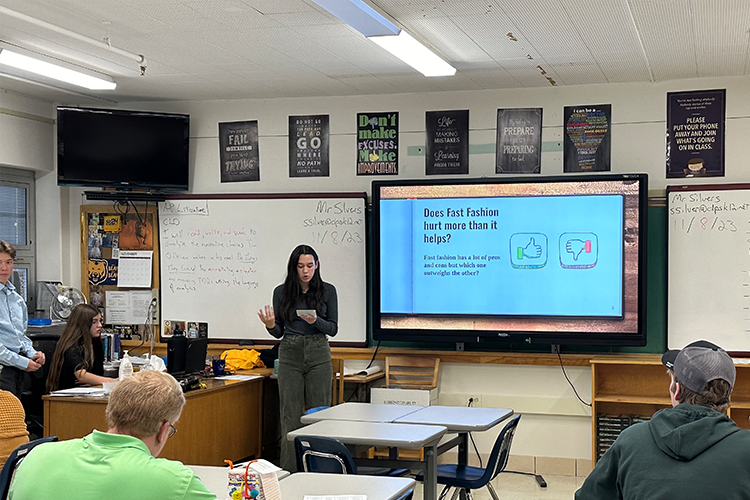
In AP Seminar, students learn to present their research and ideas to their peers. photo by Ravi Apte
TJ is one of many schools to offer an AP Seminar class, which prepares students for college by teaching them how to research, work in groups, structure their writing, and more.
AP Seminar is one of the newest Advance Placement (AP) classes among the 38 offered across the country. This year, TJ joined more than 3,000 schools that offer AP Seminar and already over 100 students at TJ are taking the class. In 2014, AP Seminar was created as part of the AP Capstone program, which also includes another class, AP Research (which is not offered at TJ as of 2023). If a student takes both classes and earns a score of three or higher on both AP Capstone courses and four other AP exams of their choice, they earn the AP Capstone diploma.
In the class, students build skills that include research, collaboration, presentation, public speaking, and more. Over the course of the year, students choose topics they want to research and work both in groups and independently to create presentations and research papers to share their findings with their peers. “You really need to learn to work together to accomplish a goal,” said Sean Silvers, one of the two AP Seminar teachers at TJ. Silvers has been teaching English classes for 29 years, but this is his first year teaching AP Seminar. He described why he decided to teach the class, saying, “I got excited about what the students were going to learn… and saw how it really is going to transfer to not only next year in Lang but also in college.”
The AP Seminar exam, unlike many other AP exams, incorporates several projects in addition to the standard exam into its grade. “You have two big projects during the course of the year,” Silvers explained. One of them, a team project (called Performance Task 1: Team Project and Presentation), requires students to choose a real-world issue and consider solutions for it. This first project makes up 20% of the final AP Seminar exam score. Students choose a lens to investigate the problem with, such as how historical events have impacted the issue, and each student writes a research report that describes the relationship of the perspectives related to their lens to the chosen group topic. Then, students share their work with the rest of their group and begin to combine each team member’s findings into a group presentation. Together, they describe their issue and present a solution to the class. After the presentation, each student is asked one question by the teacher to “prompt student reflection on their experiences with group collaboration,” according to College Board. Learning to work well in a group is one of the main focuses of this project, which Silvers says is “great, because that’s what most jobs are gonna require when you get out of school.”
After the first performance task (PT1) is finished, students jump into the second, called Performance Task 2: Individual Research-Based Essay and Presentation. The second task makes up 35% of the exam score and is similar to PT1 in that students research a topic, write an essay, give a presentation, and answer questions about it. However, unlike PT1, PT2 is all individual and based on provided materials instead of whatever the students choose. In both projects, students have to make sure to avoid plagiarism by creating a bibliography or a works cited page with the sources they used throughout their research.
Finally, at the end of the year, students take the AP Seminar end-of-course exam, worth 45% of the AP score. During the exam, students are first given a source and have to analyze and answer questions about the source’s argument, line of reasoning, and effectiveness. Next, they have an hour and a half to write an argumentative essay using at least two of four different sources provided as evidence to support their argument.
The skills students build in AP Seminar are not only helpful in that class but also in future AP classes, college, and even jobs. “If I learned some of the stuff that you guys are learning now in high school, college would have been… just that little bit easier,” Silvers explained. “It’s fun, and you’re going to build skills that will do you well in the next chapter beyond high school, whether that’s college or work.”